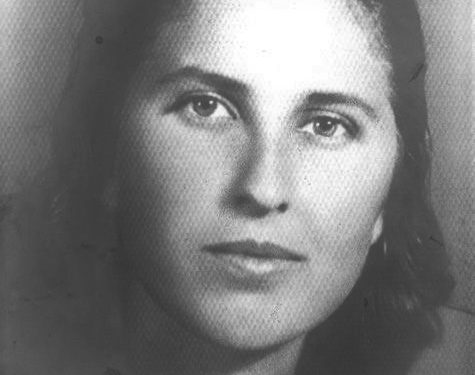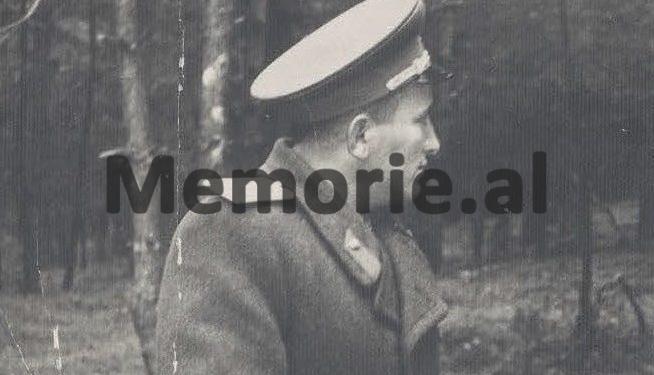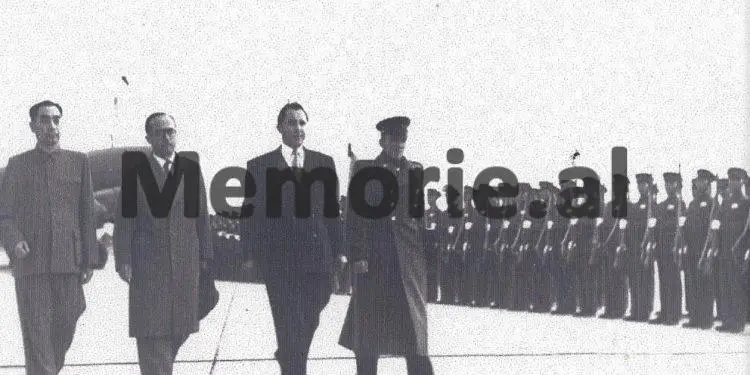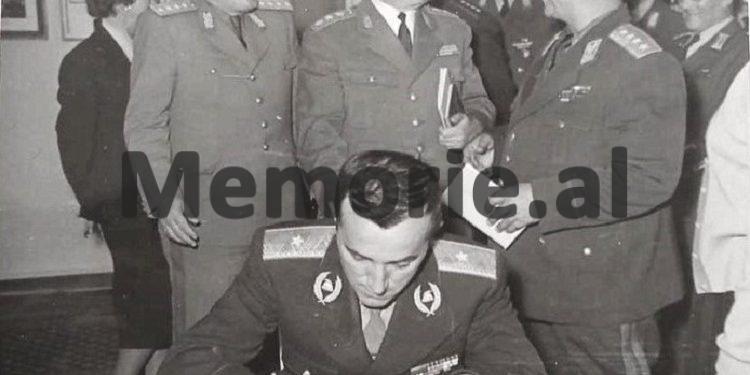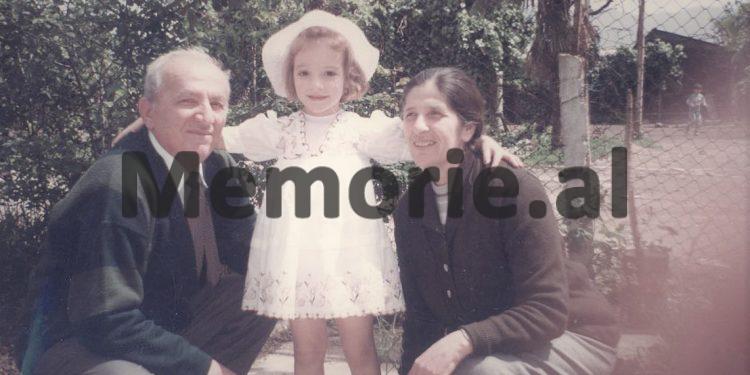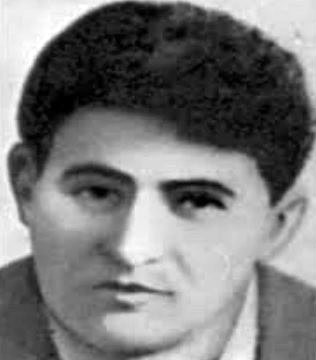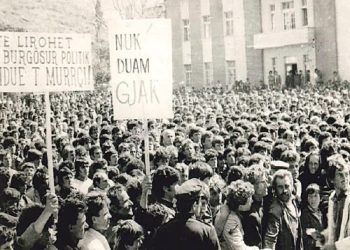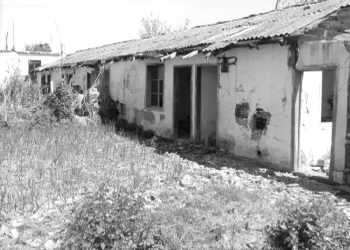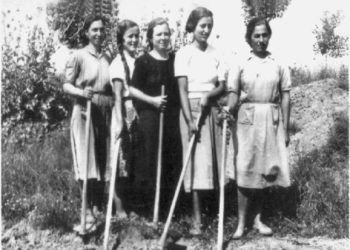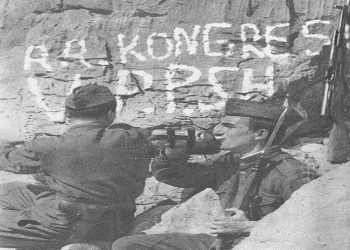By Halim Ramohito
Part four
Memorie.al / Halim Ramohito, one of the remaining former generals from the group of soldiers who were arrested and exiled as the “coup group” of 1974, by Enver Hoxha. At the head of this group was Beqir Balluku, and behind him, the most honorable caste of soldiers of the time, among them General Ramohito, who, after participating in the ranks of the National Liberation Army, had served as a representative of Albania and as a military attaché in The Treaty of Warsaw’. A witness to the break with the Russians, Ramohito would later become a witness to the destruction of the Albanian army by the dictator Hoxha, who showed that during his stay in power, he did not want qualified people around, but only servile ones. Ramohito, calm and with the coldness given to him by the distance of time, took out and published his memoirs, without which perhaps the history of that time with the “putschist group” would not be complete, it might even be written crookedly or deformed …!
With a rare sincerity, he recounts his feelings during the infamous meeting of the PPSh Central Committee, where the military caste of the time, led by Beqir Balluku, were expelled from the party, then arrested and exiled for years. Even though he had to take off his jacket gradually, to work the land like a farmer in the long exile, even though he had to stop seeing his mother even in death, his biggest hostage, the “self-criticisms” that he had to, for the sake of the party. “Enveri killed us even with our own hands…! – writes Ramohito, in the first part of his memoirs, “In the service of my Fatherland”, published by “Grand-Prind”.
Continues from last issue
The script in the execution of Ramize Gjebrea
General Halim Ramohito’s memoirs shed light on the barbaric execution of partisan Ramize Gjebrea, accused of breaking army laws by falling in love with her fellow partisan. Ramohito, who had known him closely and was a friend of Ramizea, blames all those who participated in the infamous meeting of the Fifth Brigade, where no one defended him, but with a terrible scenario, they prejudiced him, threw mud on his name hers and then shot him without warning.
Ramohito expresses an extraordinary impression of this girl, who, as he says, was beautiful, smart, and her speeches before the partisans were unrepeatable. Perhaps for these qualities she had the nickname “Interestantja”.
The memories of General Halim Ramohitos, for Ramize Gjebrea
“Ramizeja was a girl; I would say a rare and interesting phenomenon, just as she had the name of the war, “interestingly”. I am an eyewitness when I say even now, after more than sixty-five years, that her beauty, bravery and intelligence merged into one. As is known, intelligence without bravery can turn you into a worthless person, a board that anyone can step on your personality, but even bravery without intelligence can lead you to uncontrolled, even adventurous actions.
I repeat, in Ramize Gjebrea both of these qualities were merged into one. She, as they say in Labëri, was a brave, clever girl. These qualities inspired in her patriotism and ardent love, to see her homeland only free and advanced. For these reasons as well, I think and propose that the name of Ramize Gjebre should be placed on the stand of prominent leaders of the Anti-Fascist National-Liberation War in the National Museum. I think her photo deserves to be in front of our names on this list. I have her photo in my archive of LANÇL documents, where from the first glance; you can see grace and pride.
Ramizeja had many positive qualities, which I will try to present in these modest notes. She was born on April 30, 1923, in a patriotic Girokastrite family. He grew up in the city of Berat, where he finished primary school with high results. In the years 1935-1940, she was in the first ranks of the “legendary” Anti-Fascist girls of the “Queen Mother” high school in Tirana. She excelled there both in studies and as a progressive activist and anti-fascist revolutionary. There, her friends baptized her with the conspiracy name of LANÇL, “interestingly”. For all of us, this name was very significant.
For everyone who met her and listened to her during that difficult period of work and struggle, Ramizeja was interesting and could not help asking the question, how beautiful it is to see a girl who has just turned eighteen years of her life embody in the whole being, two qualities so indispensable, especially for the struggle for liberation, bravery and intelligence. Ramize Gjebrea had these two qualities and displayed them best in the school benches, but also in the many anti-fascist actions in the city of Tirana. She showed them, in her fervent oaths before the bodies killed by the fascists, of her war comrades, Misto Mames and Ramiz Aranitas, etc. Ramizeja, in complete illegality, at the beginning of 1942, accompanied Qemal Stafa to Gjirokastra, in his work as a youth leader.
She also developed many other anti-fascist activities, not only in Tirana, but also in Shkodër and Berat. I had my first meeting with Ramize Gjebreja in June 1943, in the village of Ramicë in Vlora, which for us, during LANÇL, was a fortress of war and nature, located in the middle of the mountains of Çipini and the White Mountain. During the LANÇL period, we, the partisans, also considered this small village as; our “headquarters” of the war in the region of Vlora. This, perhaps also due to the fact that there, in the house of two of the prominent former leaders of LANÇL and our Armed Forces, in the tens of years after the liberation of the country, Bako and Mevlan Dervishaj, the offices of the leaders of the Anti-Fascist Council were located National Liberation and of the District Committees of the Party and the Communist Youth, of the Vlora district.
In this village, two workshops were set up for the repair of partisans’ clothing. At the foot of Mount Çipin, in a natural cave, the partisan hospital was also located, almost without equipment, but with prominent local and foreign (Italian) professional doctors, ex-soldiers very dedicated to this work. The occasion for the first meeting with Ramizena was her introduction by the Organizational Secretary of the Regional Committee of the Communist Party of Vlora at that time (Manush Muftiu), in a meeting where we had gathered for the next meeting of the Regional Committee of the Communist Youth for Vlora. Ramizeja, who was assigned to lead this committee, as its political secretary.
In this meeting, participants were Ymer Veshi, organizational secretary (later, he left for Mallakastër with the task of secretary of the Communist Party Committee of this province), Kastriot Muço, in charge of this committee for military problems, Babaçe Faiku and Teki Alushi, in charge of working with the youth of the village and Amali Pjero e, Halim Ramohito, in charge of working with the young women and young men of the city of Vlora. Ramizeh had an attractive face and an average body. She was dressed in a well-kept, honey-colored uniform of the English army, holding a Chronometer watch in her hand and writing with a Pelikan fountain pen, which was in demand in those years. Every month Amali Pjero and I, with strong security measures, illegally, were forced to leave the city, for the next meetings of the Youth Circle, following the road from Vlora, through the olive groves towards Kanina, and then we moved to the areas liberated through the villages of Gumenicë, Velçë and Ramicë, where these meetings were usually held.
On one occasion, while returning to the city, in the village of Kaninë (in July 1943), we encountered an ambush by a unit of the Italian fascist army. During the struggle with them, our companion, the former leader of the Anti-Fascist Youth of the “Varosh” neighborhood of Vlora, Nure Alushi, was killed. In this attempt, Ismail Halili, who was accompanying us on the way back, also broke both hands. As a rule, the following issues were included in the agenda of the meetings of the Regional Youth Committee: – The political situation on the fronts of the Anti-Fascist War in the country and on the international front; – The activity of the District Youth in this war and the tasks for the future; – Eventual communications of orders from the Central Youth Committee, which were delivered to us by the delegate of the Central Youth Committee, Ramadan Xhangolli (“Xhakja”), who also read us letters with instructions from Nako Spiros, Political Secretary of Central Communist Youth Committee and later president of BRASH, signed with the pseudonym “Deti”.
In addition to the above issues, on the agenda of our meetings, there was definitely an item related to criticism and self-criticism. These issues were also on the agenda at this first meeting of the Regional Youth Committee, which was chaired by Ramizeja. With the duties, as a member of the District Youth Committee in the Vlora District, later as the head of the Youth of the Fifth Brigade, and as deputy commissioner of the fifth battalion, in all the cases where I have participated, in these meetings of innumerable youth and party forums in the wards, for which I also kept notes in my diary, in no case do I find any item on the agenda related to issues of a “communist” ideological character, as we considered it ourselves, “name” which we defended so fanatically in that period.
As I quoted above, in all our analyses, whether in the Party and Youth forums, at least in the Fifth Brigade, where I was also in leadership duties, the agenda of our analyzes mainly included only the problems of The Anti-Fascist National-Liberation War, our military-political positions in this war and, in some cases, problems of the moral image of the young partisan were also discussed. Ramizeja, as a master of illegal work, could not be kept by the country, closed only in this small center in the village of Ramicë. She wanted to meet directly and continuously with the youth organizations in the villages, and she started this work immediately from those days when she went to the liberated areas, in the province of the Sea Coast. Her impressions of this trip, if we look at them compared to the very narrow horizon that we had at that time, in the analysis of problems, seem to me far-sighted judgments even today.
This is what Ramizeja wrote on August 28, 1943, to the head of the Anti-Fascist Youth of that period in the province of Bregu and to her friend from the “Queen Mother” school, Agllai Zoto: “Agllai, I have only been away from that side for a week and since there I was busy with other work (of the Anti-Fascist National-Liberation Front), I held only one conference in the village of Vuno, where all the young women of the village participated. They were good, but we still need to work more with them. For you, Agllai, to get to know them better, I order you to hold several conferences with them. Do them in every village you pass, such as in Qeparo, Kudhës, Dhërmi, Palasa and Himare.
Be careful, Agllai, at first do not speak directly to them only about their war duties in the village, but, in the first place, about the fight that the young women of the whole world are making for freedom and independence, and then bring this matter up. With the fight that our young women are doing today in Albania, against the invaders and, then, connect this issue with the common tasks that we face in the common anti-fascist liberation war. And so, with these explanations, at first those girls will surely get excited and then, gradually, they will bond with us. When these young women will ask to join our Anti-Fascist Youth activities, let’s tell them that the conditions to be accepted are simple, it is enough that they are moral, not selfish and ambitious, but loved by all”. “We must work, – instructed Ramizeja Agllaina in this letter, – so that the youth of your province and all of Albania, all of our people, understand well that we are for the Anti-Fascist National-Liberation War, and not to bring the country our Russia, Serbia or Greece…”!
I underlined this commandment, because for the time it was of great importance. At this point, we should be well prepared to resolutely and intelligently oppose the propaganda of the invaders, but also of their collaborators, which defamed the goals, even strategic, of our war. In many meetings with the young women of Vlora, I had heard Ramizena tell them that; as soon as our homeland is liberated, opportunities will be created for the young women of Albania to freely decide on their family life as well. In the Youth Circle of Vlora, Ramizeja worked together with Ymer Veshi (his war name “Ylli”), this veteran leader of the Communist and Anti-Fascist Youth in the Vlora district, since April 7, 1939. Both together, Ramizeja and Ymeri , worked hard for the organization of the District Youth Conference, which would later lead to the creation of a single Youth organization, which was called the District Anti-Fascist Youth Union (BRASH).
This conference, although in difficult war conditions, was successfully held in a hut in the village of Bolena in Vlora, on December 31, 1943. The first chairman of the BRASH Council was elected Ymer Veshi and the General Secretary Ramizeja. This new youth organization played an important role for the expansion of the Youth Organization and the addition of partisan ranks, with young people from the district, especially those from the villages. In the Fifth Brigade, which was the largest partisan formation in the region of Vlora, Ramizeja was also charged with the duty of the member of the Political Section, with the work sector, that of the responsible of the Youth of the Brigade. In addition, with her experience and literary talent, she also helped publish the brigade’s newspaper, with the title “Buçitja”.
A special impression was made by Ramizeja’s speech in front of about a thousand lined-up partisans and many residents of the province, on January 20, 1944, in a lawn near the village of Tërbaç (in Bramushje), on the occasion of the official inauguration of the Fifth Partisan Assault Brigade ( In fact, the exact date of the creation of the 5th Brigade is November 28, 1943, in the village of Gumenica in Vlora, initially with only three battalions, a day that coincided with the 31st anniversary of the declaration of independence). In that meeting on January 20, 1943, hundreds of lepers took part, deliberately coming from all the provinces of Vlora district, even Kurvelesh. Many participants then enthusiastically told me that they had seen such a meeting only in June 1920, the day when the insurgents in the War of Vlora liberated the city of Vlora itself, throwing the Italian occupation units into the sea.
I remember Ramize’s fiery speech at the inauguration meeting of the Brigade, which left many impressions on all those present. In this speech, also according to the notes kept in my diary, she raised the fight against the Italian monarchist invaders in 1920 and the fight of the people of Vlora, against the Italian fascists, on April 7, 1939. She mentioned the four heroes of the neighborhood’s youth “Topana” of Vlora, as well as the heroism of Kastriot Muço, Lef Sallata and Zonja Çurre, with friends. In the end, she closed her passionate speech at this meeting with a call to the youth and to all the people of Vlora district, that; the war is not over yet, it must rise to a higher stage and thus with the flag of Skenderbeu and Ismail Qemali, the youth of Vlora and all its people must move forward, for the liberation as soon as possible of of the whole country from the Italian fascist invaders and their tools.
I remember that after the meeting, some old lepers, with mustaches from ear to ear, with white hair on their heads, with that tail of theirs like an antenna, on top of it, and the crowbar in their hand, asked me: “Where did you find it and bring it?” here’s this girl, guys, because she seemed not only smart, but also very brave…?! She made us, the elders, happy with her words and, for this; she also blessed us with our birthday”! I told them that they had sent her to us from Tirana, to lead the youth struggle of Vlora, but that girl herself was born in the capital of Labëria, in Gjirokastër, that’s why she was so brave and smart. In my meeting with those ancient lepers, like the mountains around, there was also the well-known rhapsody, uncle Selim Hasani i Brate and, as usual, right there and then, inspired by this great manifestation, but also by the participation of dozens of girls, who paraded lined up in all five battalions of the 5th Brigade, and especially inspired by Ramize’s speech at this celebration, he weaved the lines of the well-known song, during and after the war, that began with the words: Shake it Party , shake it, With boys and girls like daughters-in-law, Those who carry poture…!
The conservative mentality, especially that of the lab, in that period also in Vlora, did not allow girls to wear pants (poture). But the great uncle Selim, who obeyed only the canons of patriotism and prayed only to the Lord of his divine song, for the conditions of the war, not only allowed them to dress like this, but was also happy to see them dressed like the warriors of early; because that’s the only way they looked beautiful like “nure”. After the official inauguration ceremony of the Fifth Brigade, on January 20, 1944, all five of its battalions left for the designated defense sectors to face the great Winter Operation of 1943, which had just begun. in the region of Vlora. As a rule, but especially under the conditions of that difficult Winter Operation of 1943, the command of the Brigade and the other leaders of its political section had decided to disperse among the battalions, as their delegates.
Ramizeja was assigned to the Third Battalion, where the deputy commissioner was People’s Hero Zaho Koka. Everything seemed to be foretold and predetermined. Even Zaho’s work and duty in the political sector in that period would connect him more with Ramizeja. It has become a habit for us since the time of the war (this is probably also due to the respect and love we have for our fellow martyrs), that in the stories and memories about them we also clothe them with beauty and rare physical physical qualities, but in reality nature had given the legendary Zaho Koka these physical gifts. He had a long body like a cypress tree, broad shoulders and a beautiful face, which blushed even when he spoke in that beautiful dialect that the Vunjotas Albanians speak. Memorie.al
The next issue follows




